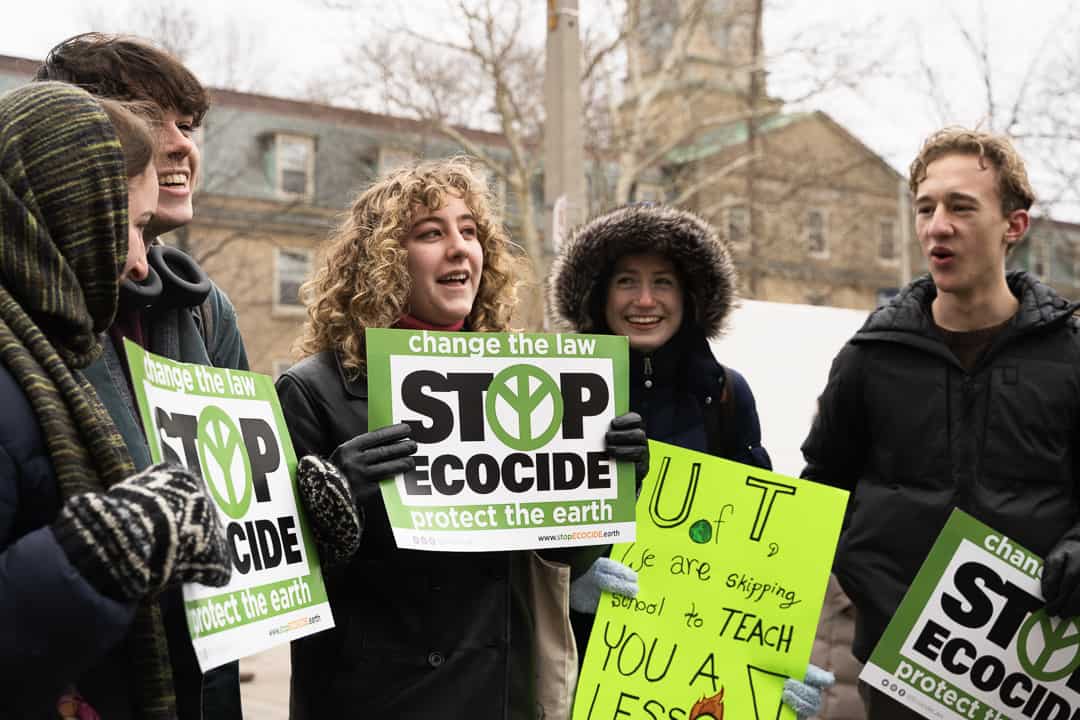On March 3, over a hundred U of T students gathered to protest against U of T and the University of Toronto Students’ Union’s (UTSU) climate policies.
The strike was jointly organized by Climate Justice UofT — a student activist group — Stop Ecocide Toronto — the municipal branch of a global movement that aims to make environmental destruction an international crime — and the Victoria University Students’ Administrative Council’s (VUSAC) Sustainability Commission. The event was part of a global day of action created by Fridays for Future, a youth-led international climate strike movement that aims to pressure policymakers to take action against the climate crisis.
The crowd called on the university to stop accepting research funding from fossil fuel companies and endorse an international law against environmental destruction. In addition, protestors demanded that the federated colleges divest from fossil fuels and that the UTSU sever its connections to the Royal Bank of Canada (RBC).
In an email to The Varsity, a U of T spokesperson stated that the university is “grateful to members of our community who are bringing their diverse expertise and energy to helping the University of Toronto achieve its goals – including the goal of being Climate Positive by 2050.”
The protest
Around 1:00 pm, a crowd gathered in front of Sidney Smith Hall, with some protestors holding signs. The protest coordinators began delivering speeches laying out their demands around 1:15 pm. Shouts of support and chanting from the crowd punctuated the speeches.
After the speeches, the crowd marched north on St. George Street and turned right on Hoskin Avenue. As the crowd passed Trinity College, the protestors began chants calling on Trinity College to withdraw its investments in fossil fuel companies. As the crowd walked through Queens Park, they began to direct their divestment chants toward Victoria University. The protest closed with a final speech on the steps of Victoria College Building, also known as Old Vic.
Call for federated colleges’ divestment
Protesters presented four demands. The first calls for the federated colleges to divest from fossil fuels. The university agreed to divest its portfolio by 2030, but the federated colleges — Victoria University, University of Trinity College, and the University of St. Michael’s College — as well as the university’s pension plan have made no commitments to divest. In 2022, Ultra Vires, the Faculty of Law’s independent student newspaper, reported that the federated colleges’ endowments amounted to approximately $665 million, with Victoria University holding a share of about $507.7 million.
In a speech at the protest, VUSAC Sustainability Commissioner Amy Mann argued that, by refusing to divest, the federated colleges were “refusing to care about our basic futures [and] refusing to allow us to live on a livable Earth.”
In a September 2022 statement to The Varsity, a Victoria College spokesperson wrote that the Victoria College’s Board of Regents, which manages the college’s endowment, planned to hold an annual review of its investment policy in the following months. They also expressed support for student advocacy on climate issues.
Call for U of T to support Stop Ecocide
The protesters’ second demand called on U of T to put its institutional weight behind a movement to create an international law criminalizing environmental destruction. Amalie Wilkinson, a third-year student studying international relations and peace, conflict and justice studies and the founder of Stop Ecocide Toronto spoke at the protest. She called for “a fundamental transformation of the way we treat the environment in our laws.”
In an email to The Varsity, the U of T spokesperson acknowledged that universities must help address the climate crisis “as well as the 16 other United Nations Sustainable Development Goals that address environmental and human wellbeing.” The spokesperson added that the university “look[s] forward to continuing engagement with students and other members of our community keen to advance sustainability efforts.”
Call to remove RBC in Student Commons
As their third aim, protestors want to get rid of the RBC branch in the UTSU Student Commons until RBC stops providing funding to fossil fuel companies. In a speech, Erin Mackey, a member of Climate Justice UofT and a fourth-year student in political science and environmental studies, noted that RBC is the fifth-largest global funder of fossil fuels and the largest in Canada.
Mackey questioned why the UTSU continues to partner with RBC. “How is having a bank that funds the climate crisis welcoming to its students?” she asked.
After Climate Justice UofT staged a sit in at the UTSU Student Commons’ RBC branch on March 2, UTSU President Omar Gharbiyeh told The Varsity via email that the union plans to discuss Climate Justice UofT’s demands and hopes to work with the student activists to “explore our options and represent students.”
Call to stop funding research with fossil fuel investments
To discuss the protestors’ fourth demand, Mathis Cleuziou, a second-year student pursuing a degree in economics and environmental science, gave a speech calling on U of T to stop accepting funding from the fossil fuel industry for research involving the environment or energy. He noted that in November 2022, U of T invited Imperial Oil — a company that spread climate disinformation in the 1970s — to the university’s Climate Economy Summit.
Cleuziou argued that accepting funding from fossil fuel companies influenced the university’s research, allowed fossil fuel companies to greenwash their image, and damaged the university’s reputation as an objective research institution. “It is time for us to lead by example, and pave the way toward a more sustainable future,” he told the crowd. “Big Oil has no place on campus.”
The U of T spokesperson wrote in an email to The Varsity that the university has guidelines and practices that were established to “guard against undue influence on research.” These include policies on research ethics, publication, and conflict of interest, as well as a statement on advisory bodies. The spokesperson added that the university also has policies in place to guide its research partnerships.


